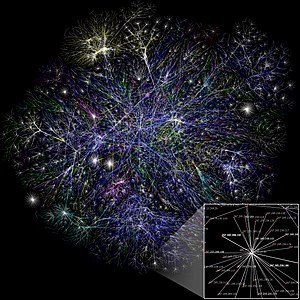Monday, September 24, 2012
#oped12 articles you start to notice
Since starting the readings for the mooc I am doing "Openness in Education" I have started to see a broader perspective
 |
| This image was selected as a picture of the week on the Farsi Wikipedia for the 13th week, 2011. (Photo credit: Wikipedia) |
"COMMONS-BASED peer production is a socio-economic system of
production that is emerging in the digitally networked environment.
Facilitated by the technical infrastructure of the Internet, the hallmark of this
socio-technical system is collaboration among large groups of individuals,
sometimes in the order of tens or even hundreds of thousands, who cooperate
effectively to provide information, knowledge or cultural goods without relying
on either market pricing or managerial hierarchies to coordinate their common
enterprise."
https://apps.lis.illinois.edu/wiki/download/attachments/15979/Benker+et+al+(Peer-production+and+virtue).pdf
"Like many of the bedrock technologies that have come to define the digital age, the Internet was created by — and continues to be shaped by — decentralized groups of scientists and programmers and hobbyists (and more than a few entrepreneurs) freely sharing the fruits of their intellectual labor with the entire world. Yes, government financing supported much of the early research, and private corporations enhanced and commercialized the platforms. But the institutions responsible for the technology itself were neither governments nor private start-ups. They were much closer to the loose, collaborative organizations of academic research. They were networks of peers."
http://www.nytimes.com/2012/09/23/magazine/the-internet-we-built-that.html?pagewanted=1&_r=1
"Going forward, IA need to ensure that the key players in Washington realize that the people building the modern Web do not consider themselves to be part of the 47 percent, 53 percent, 99 percent or 1 percent. When our politicians talk about entrepreneurship, innovation and competitiveness these days, they’re often really thinking about behemoth corporations and the types of tax cuts and politically-motivated moves that will turbo-charge the next quarter. Instead, they should be thinking long-term and talking about keeping it cool for kids to finish school, study programming and make their first job working at a startup with the potential to change the world. We built the Internet — let’s not forget it."
http://www.washingtonpost.com/blogs/innovations/post/the-internet-we-built-it/2012/09/20/33d939d2-032d-11e2-9132-f2750cd65f97_blog.html
"But he bottom line question he asks is this: At what point should publishers expose the book’s entire content to all the search engines? And while he offers no easy one-size-fits-all answer, he does point to the example of Craig Mod, whose book Art Space Tokyo has been published in digital editions across multiple platforms, “within two distinct ecosystems:”
1. open [the web]
2. and closed [iBooks, Kindle, and other ereaders]
http://publishingperspectives.com/2012/09/should-you-expose-all-your-books-content-to-search-engines/
Wednesday, September 19, 2012
#oped12 Why are Australian Universities avoiding this movement?
Benefits of Membership
The mission of the OCW Consortium is to serve both the individuals who use OCW and the institutions that make OCW possible. The Consortium provides a gateway to OCW projects and courses for the entire OCW community, fostering the success of the OCW movement and articulating its benefits. Through its public-relations efforts, the Consortium educates general audiences about the movement, directing potential users to resources that best suit their needs. For members, the Consortium marshals broad expertise regarding the ongoing development of open education projects and connects its members with an even broader network of OER practitioners. In other words, the OCW Consortium is an ideal meeting place for people wanting to make structured contributions to the development of open education worldwide.
I have found a paper that looks at the Australian Universities case in depth.
I have found a paper that looks at the Australian Universities case in depth.
#oped12 Webcast Invitation: Connecting the Dots between Open Access and Open Educational Resources September 27, 2012 (SPARC)
Connecting the Dots between Open Access and Open Educational Resources
Another free SPARC online event
Thursday, September 27th, 2012
12:00 - 1:00PM EDT (use helpful time converter)
Registration is free, but required. Please RSVP by September 25th.
This Webcast only requires an Internet connect (no phone dial in needed).
This Webcast only requires an Internet connect (no phone dial in needed).
Webcast Invitation: Connecting the Dots between Open Access and Open Educational Resources September 27, 2012 (SPARC)
Friday, September 14, 2012
Thursday, September 13, 2012
#oped12, College Textbooks | Read Free Online | Flat World Knowledge
 |
| Flat World Knowledge (Photo credit: Wikipedia) |
 |
| Flat World Knowledge: Open College Textbooks (Photo credit: opensourceway) |
Just started new mooc called:
openness in education
and this is a resource I had not heard of before mentioned in a lecture by David Wiley.
Related articles
Subscribe to:
Comments (Atom)

